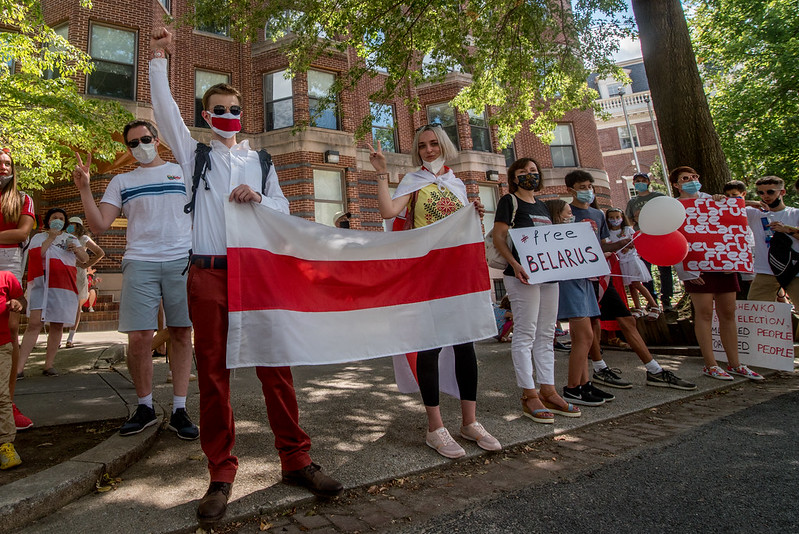The tide is turning in relations between Belarus and Russia, as protests against Belarusian President Alexander Lukashenko continue while the authorities threaten to take tough new steps against demonstrators. For Minsk, Moscow is no longer “aiming to destabilize Belarus”, while the Russian Kremlin-friendly media no longer have a sympathetic tone toward anti-Lukashenko protesters.
Mass protests, as well as nationwide strikes in Belarus, erupted after Belarusian opposition, Western powers and certain Russian structures accused the Belarusian leader of rigging the August 9 election. According to the official results, he won 80 percent of the vote, while his major rival Svetlana Tikhanovskaya got only 10 percent. The European Union, United Kingdom and the United States did not recognize Lukashenko’s victory and are expected to impose sanctions against the Belarusian President and his coworkers. Russia’s President Vladimir Putin, on the other hand, congratulated Lukashenko on his victory in the controversial Belarusian presidential election, although several senior Russian officials, as well as Russian mainstream media, started criticizing Belarusian leader over election manipulation and crackdown on protests.
In the meantime, Putin and Lukashenko spoke several times over the phone, and the Belarusian President said that the Russian leader promised he would ensure Belarus’ security. Although many analysts speculated that Russia would soon invade Belarus in order to save Lukashenko, such a scenario never came true. The two leaders have likely made some financial deals whose results have yet to be seen.
Russia’s official rhetoric toward Belarus’ leader gradually changed. Instead of continuing to blame Lukashenko for the election manipulation, as well as repression against protesters, Russian officials and propagandists such as Vladimir Solovyov started condemning Western partners’ interference in Belarusian domestic affairs. Lukashenko also ramped up his anti-Western rhetoric, accusing NATO of seriously stirring up tensions on the country’s western border and announcing he had deployed military forces there and put troops on full combat readiness. Over the past two months, the Belarusian President has accused both Russia and regional countries such as Poland and Lithuania of trying to force a Ukrainian-style Maidan coup in Minsk several times, but now for him Moscow no longer seems to be an enemy. In other words, Russia was “racketeering” Lukashenko by joining the official Western narrative and condemning “the last European dictator”, and now that he has promised to make some concessions to the Kremlin, he is no longer “a bad guy” in the eyes of Russian media.
Lukashenko has openly admitted that he has hired Russian PR experts to assist him in a propaganda warfare. Their results are already visible. At the very first stage of the anti-Lukashenko protests, the Belarusian leader did not have a single bot or troll on social media. Now there are several accounts, especially on Telegram, that successfully spread pro-Lukashenko propaganda. In addition, he managed to consolidate his power and started holding rallies on a daily basis all over Belarus. Also, the Belarusian state media showed footage of Lukashenko armed with a Kalashnikov submachine gun and bullet-proof vest condemning the protesters outside his official residence.
“We’ll stand by your side until the end,” security forces chanted when the president visited the palace gates.
“Thank you, you’re great guys,” he told the forces standing guard.
Such a PR move was likely recommended to Lukashenko by Russian media experts. The goal is clear – to send a strong message that he does not intend to leave Belarus, and that he is ready to defend himself with weapons in his hands if there is an attempt by the opposition to storm administrative buildings, including the presidential palace.
In the meantime, even though Lukashenko said he ordered his security agencies to restore order on the streets – which some see as a potential renewed crackdown on demonstrations – his primary goal will likely be to resolve the issue of a nationwide strike. Reportedly, the co-chairman of the Belaruskali (one of the world’s largest producers of potash fertilizers) strike committee Anatol Bokan has been detained, as well as Alexander Laurynovich, the chairman of the strike committee of the Minsk Wheel Tractor Plant. Belarusian authorities are expected to keep arresting or firing strike leaders in order to stifle labor stoppages. In the midterm, the anti-Lukashenko protests could become less massive, which is the case in Russia’s Far Eastern city of Khabarovsk, where people started protesting on July 11 in support of the then governor, Sergei Furgal, after his arrest. Although the protests there still take place, they started fading away as there are only walks, but no results. Demonstrations in Belarus could have the same fate, as Lukashenko will certainly not step down just because the crowd is walking and chanting “Go away”.
Unless he is assassinated, or if the security apparatus betrays him, Belarusian leader will leave his post only after the constitutional reform and redistribution of power, which could take at least a year, or even until the end of his term in 2025. In the meantime, he will likely have to make some very serious concessions to the Kremlin in order to pay back Russia’s support.
Image credit: Angela N

